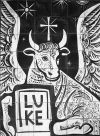
The Gospel of Luke
Procession on the Mount of Olives: Lk 19,29-40
If we read verse 28 as the conclusion of the preceeding parable, then we discover that Jerusalem is not mentioned at all in these verses. That may be a surprise because just about every Bible echoes the other three Gospels and announces at this point the Entry into Jerusalem. In Verse 41 though Jesus is still drawing near to the city.
It is though notable that Jerusalem is only mentioned after this as an object, 21,20 or 23,28 for example. Nowhere does Luke say Jesus enters Jerusalem as does Mark (Mk 11,11). Instead Luke refers to the city as in verse 41 and in verse 45 Jesus' entrance is into the Temple.
Thus Jerusalem in verse 28 can be seen as an overall setting for all that follows.
However, only Luke sets the procession on the Mount of Olives, across the valley from the old city of today. It is in the prophet Zechariah that we find the significance of the Mount of Olives where it is said that it is the place where the Messiah will appear (Zech 14,4).
Jesus' instructions and their fulfilment by the disciples in verses 30-34 are to be seen as an unfolding of the divine plan. Jesus' knowledge is not magic or miraculous.
All four Gospel accounts of this procession pick up on Zechariah (Zech 9,9) where the Messiah comes riding on a colt or donkey.
However, in Luke the crowd spread only their cloaks before Jesus, the palm branches of Mark are not there. As the cloak is a person's most important posssession, this indicates the importance of Jesus.
Unlike the other Gospels, here in Luke it is the disciples who acclaim the coming of Jesus. This makes the event more like a coronation, especially as it takes place on the Mount of Olives. This is followed by the quotation from Psalm 118, a royal processional psalm to which Luke has added the word "king". The reference to peace takes us all the way back to the announcement of the angels at his birth (2,14). Yet the preceeding parable about the kingdom provides a different context as we have seen.
Thus the Pharisees have cause for concern in verses 39: Jesus seems to be getting rather close to politics for their comfort and the Romans may take an interest as a result.
The rather enigmatic quotation from the Habbakuk in verse 40 would then indicate that Jesus is going beyond politics, that there is something deeper here which leads to the lament over Jerusalem which follows.
We can now return to the main page.
